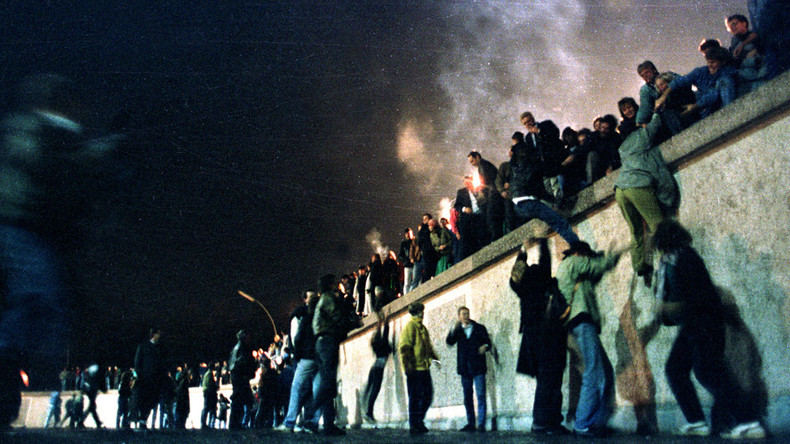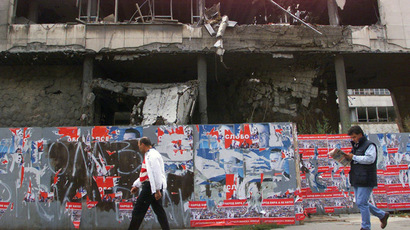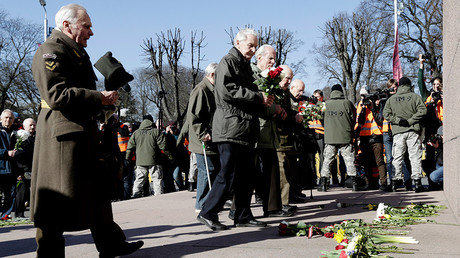How the West built Berlin Wall 2.0
Neil Clark is a journalist, writer, broadcaster and blogger. He has written for many newspapers and magazines in the UK and other countries including The Guardian, Morning Star, Daily and Sunday Express, Mail on Sunday, Daily Mail, Daily Telegraph, New Statesman, The Spectator, The Week, and The American Conservative. He is a regular pundit on RT and has also appeared on BBC TV and radio, Sky News, Press TV and the Voice of Russia. He is the co-founder of the Campaign For Public Ownership @PublicOwnership. His award winning blog can be found at www.neilclark66.blogspot.com. He tweets on politics and world affairs @NeilClark66

How ironic as the latest anniversary of the fall of the Berlin Wall is being commemorated this week, a new wall has been constructed between East and West.
It’s not a wall you can actually see, but it’s there all the same. Far from being thrown into the dustbin of history for eternity, the old Cold War divisions are now arguably more pronounced than they were in the 1980s. Russia, for daring to thwart Western regime plans for Syria, finds itself sanctioned by the US and EU, with NATO forces on its borders. A crude form of Russophobia, the acceptable form of liberal racism, has become normalized in elite circles in the West. At the same time, countries in the old communist bloc that don’t do exactly what their ‘democratic’ US and EU masters demand face harsh penalties for their insubordination, and the demonization of their leadership.
It’s all a far cry from what the people of Eastern Europe would have hoped for in 1989. Those who lived behind the so-called Iron Curtain and who regarded the West as a beacon of truth and liberty have seen their illusions cruelly shattered.
I happened to be in the old East Germany, on holiday with a university friend, in the late summer of 1989. The government was getting ready to celebrate ‘40 Jahre DDR’. I bought a DDR calendar for the year 1990 filled with photographs of marching workers and busy shipyards and factories. But by the time 1st January arrived, the game was all but over for the ‘workers state,' and my calendar became a collector’s piece.
I met a wide range of people on my trip, but one married couple made a particular impression. The biggest gripe they had with the East German system was the restrictions on traveling outside of the communist bloc. As fellow aficionados of detective fiction, they yearned to visit London, where so many of their favorite ‘krimi’ novels were set. The foggy London of Sherlock Holmes and Edgar Wallace’s The Ringer- with its red double-decker buses and pea-souper fogs! We chatted almost every evening in our hotel in Wernigerode (where locals would also come in to play cards, have a drink and smoke and socialize), and later, when the Berlin Wall did come down I received a letter from my friends jubilantly declaring ‘Freiheit’!’
Sadly what appeared to be ‘liberation’ in 1989 turned out to be a new form of subjugation. Yes, some precious new freedoms were gained, but so much that people took for granted under socialism like guaranteed employment, extensive provision of social services, affordable household bills, and housing costs, and very low crime rates was lost too.
As state-owned factories were privatized or closed down altogether, a large percentage of the population lost their jobs. There was a massive rise in poverty.
Post-1989 Eastern European countries were hit by what the Hungarian economist Laszlo Andor has called a ‘Great Depression.'
The figures are truly startling. “Luckier countries like Hungary lost only about 20 percent of their national income in the years after 1989, while the GDP of others fell by 30-40 percent,” Andor writes.
In Russia, the post-communist economic collapse was so severe that life expectancy was reduced by five years in the period 1991-94.
The fall of communism didn’t just lead to an economic crisis, but a humanitarian one too. It’s one we don’t hear too much about in the West because it doesn’t fit the ‘liberation’ narrative.
Meanwhile, the promises that the Soviet leadership thought they had got from the US for NATO not to expand ‘one inch eastward’ following the reunification of Germany proved not to be worth the paper they weren't written on.
In Washington hard-hearted neocons hell-bent on world domination, plotted a New American Century. Countries in Eastern Europe were pressurized into joining ‘Euro-Atlantic structures,’ globalist shorthand for membership of the EU and NATO. The economies of the East had to be restructured for the benefit of Western finance capital.
Any attempts by countries to resist this ‘reform' process were firmly dealt with. Democracy was fine - so long as the people of the East voted the ‘right’ way, i.e. for the parties Washington and the financial elites of Wall Street approved. If they didn’t, then electoral processes would simply be subverted.
In Bulgaria, in 1990 the communists (renamed the Bulgarian Socialist Party) won the election, despite massive US assistance to the opposition. William Blum, in his book Killing Hope: US Military and CIA Interventions since World War Two, describes what happened next.
Similar stories unfolded across the region. Just how far the US was prepared to go to enforce subservience we saw in 1999.
In Yugoslavia, the people kept returning communists and socialists to power. Consequently, by the late 90s, the Yugoslav economy remained ‘unreformed’ with very high levels of social ownership. The punishment from the ‘enlightened’ West was brutal, a 78-day bombing campaign- and the eventual kidnap of the country’s leader Slobodan Milosevic, who was put on trial at The Hague, where he later died having been denied proper medical treatment. The official pretext for the NATO assault on Yugoslavia was ‘humanitarian’ concern for the plight of Kosovan Albanians, but George Kenney, a former Yugoslavia desk officer at the US State Department, revealed the real reason for the operation. “In post-Cold War Europe no place remained for a large, independent-minded socialist state that resisted globalization.”
Afghanistan, Iraq, Libya, and Syria, all independent non-US allied countries in strategically important parts of the world followed Yugoslavia in being targeted for destruction by the Washington hawks.
By now millions of people in ‘liberated’ Eastern Europe had come to realize that everything their communist leaders had told them about the US elites and their insatiable appetite for war, conquest, and dominion over others was true. Russians noticed too that as soon as the country regained some of its self-respect under Putin, the West resumed its hostility.
The equality that people in the East had hoped for in 1989 never materialized. A new master and servant relationship emerged, which proved to be more a subservient one than the relationship the countries had with the old Soviet Union. Post-1956, Warsaw Pact countries could follow their own path to socialism, all they had to do was to stay loyal to the military alliance with Moscow. But the ‘liberated’ countries of Eastern Europe now have to deal with a ‘double-whammy,’ namely to follow the dictates of the EU and the US State Department.
Leaders of ex-communist countries who dare to stand up for their own country’s national interests against the neoliberal globalists are subject to constant vilification. When he was raging against communists in the late 80s and 90s, Hungary’s Viktor Orban was a pin-up boy of the Western elites. But since he’s taken a more populist economic stance and sought to forge stronger links with Russia he’s been transformed in the pro-NATO media into a sinister, foaming-at-the-mouth “dictator,” or ‘”neo-Bolshevik” to use the phrase of neocon commentator Anne Applebaum.
Different standards are applied to leaders in the East to those in the West. The latter are never called “dictators” even when they clearly act in a dictatorial fashion and ride roughshod over civil liberties. But as soon as any leader in a former Warsaw Pact country does something the EU/State Department disapprove of, it’s out with the old Cold War clichés.
Take this write-up of a BBC World Service program ‘Europe’s Illiberal Democrats’ from this week’s Radio Times. “Hungary and Poland are the rebellious kids on the bloc.” (Yes, they really did call them ‘kids’).
“They teamed up to oppose both the EU and the European Supreme Court. Yet what’s happening in both countries is nothing less than the dismantling of democracy.”
We’re told the program’s presenter will talk to people about Viktor Orban’s “hatred of multiculturalism, his (alleged) anti-Semitic rhetoric and corruption” and that Poland “is a disturbing case too” as it’s “backsliding.”
Finally, we’re informed that Spain is a “huge test for the EU, but so is this ….If it won’t stop such abuses, who will?”
It’s really as if the old Cold War never ended, isn’t it? Again we have the ‘enlightened’ and ‘morally superior’ West, in this case in the shape of the EU seeking to defend ‘democracy’ under threat in the backward, totalitarian East. You know, the part of Europe where ‘corruption,' and ‘abuses of power’ are endemic.
At the same time the leaders of Catalonia face the prospect of going to jail for declaring independence from Spain (following a vote in a democratic referendum), and WikiLeaks founder Julian Assange remains a political prisoner, holed up inside the Ecuadorian Embassy in London, the capital of the most surveilled state in the world.
You don’t have to be an Orban fan or a supporter of the Law and Justice Party in Poland to acknowledge the rank hypocrisy. Twenty-eight years after the old Berlin Wall came down, we need to get to work on destroying the current edifice and exposing the supremacist ‘West is always right’ ideology which underpins it.
Follow Neil Clark @NeilClark66
The statements, views and opinions expressed in this column are solely those of the author and do not necessarily represent those of RT.





0 Comments:
Post a Comment
Subscribe to Post Comments [Atom]
<< Home